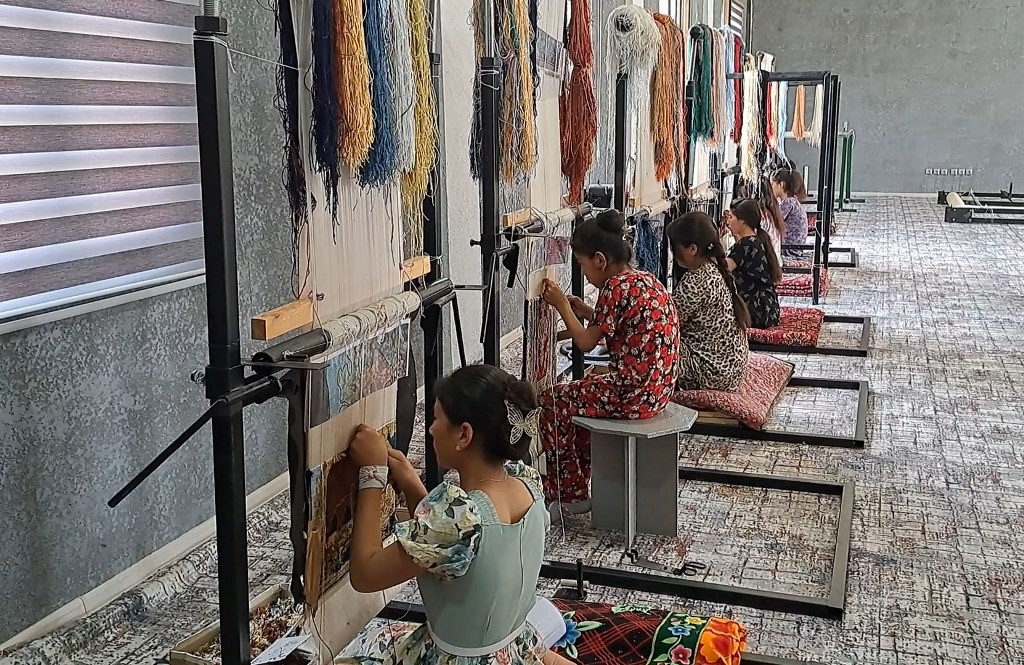Tajik women's exquisite carpets
Rediscovering the techniques of their grandmothers, which have remained unchanged for hundreds of years, a small farming village in northern Tajikistan has set up a business where women are the protagonists. They produce handmade silky woven carpets that are among the most expensive and valuable in the world.
Dushanbe (AsiaNews/Agencies) - In the small and picturesque village of Khazorčašma, in northern Tajikistan, the locals are mainly engaged in animal husbandry and agricultural work. One of them, Primkul Satorkulov, has been a dekhkanin, a rice farmer, for most of his life, but a couple of years ago he decided to devote himself to another activity, opening a workshop where local women and girls create the finest and most expensive carpets in the world.
It all started in November 2022, with a visit by President Emomali Rakhmon who inaugurated a textile factory for the manual production of silk fibre carpets. Satorkulov made himself available, involving his daughter Subkhija, one of his six daughters, being particularly sensitive to women's work in the conditions of a very peripheral village. The idea of opening his own business had come to Primkul after a trip to Uzbekistan, where he had seen local women producing world-famous oriental silk carpets.
As he himself told Asia-Plus, ‘I come from a family of weavers, my grandmothers were very skilled artisans and they used to make carpets at home, not from silk but from wool, and now I realise that they knew how to use very traditional techniques, unchanged over hundreds of years, which have been preserved especially in Uzbekistan’. Inspired by the splendid achievements of the Uzbek women and his childhood memories, Satorkulov decided to take a risk at home, supported by his brothers and sisters, and also by the offer of a substantial state subsidy for this type of enterprise. As a simple farmer, he had no experience in running these businesses, but he learnt as he went along. His family is originally from Uzbekistan, so he did not struggle to find the right contacts.
The necessary equipment was found in the neighbouring country, and some Uzbek partners offered to help start up the business: ‘We invited some experienced women from Uzbekistan, who taught ours the secrets of carpet weaving, some learned quickly, others needed more time... In many of our women the gift of weaving is in the blood, it comes from our grandmothers and great-grandmothers,’ says Primkul. This kind of activity in these parts is exclusively in the hands of women, and at the workshop in Khazorčašma, some 30 women from the village and the surrounding area soon gathered.
In the summer, girls who are free from school also come to work, after a free course in carpet spinning, also managing to get a good wage to support their families' expenses. The adult women in the summer return to the fields, and have less time for fine work, so the summer workshop turns into a ‘maiden kingdom’, controlled by Primkul's older sisters, who take on the role of the progenitors. The entrepreneur boasts of them, describing them as ‘first-class specialists’; one of them, Kibrija, has already won two competitions and has taught the trade to many other young girls, her brother says proudly, noting that ‘the younger they are, the earlier they learn, as they have no family commitments’.
For the composition of the carpets, patterns on paper are followed, prepared by the designer, and even with the complexity of the designs, it is almost impossible to make mistakes, especially as two or three people work together on each piece. The handmade silky weave carpets are considered to be the most expensive in the world, one of average size costs around 40 thousand dollars and its preparation requires 2-3 years of work. The choice of colours is very varied, ranging from thousands of shades, with very naturalistic depictions and decorations. The trade passes mainly through Turkey, after a washing and drying phase that takes place in Uzbekistan with special technologies that make the carpets particularly delicate. In this case, a true ‘silk route’ is realised in the Turanian area of Central Asia.
07/02/2019 17:28
24/10/2019 17:56
11/08/2017 20:05







.png)










